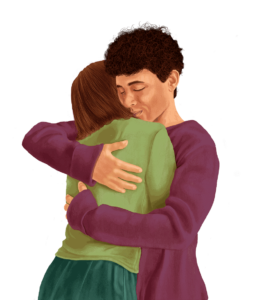The statistics are concerning. According to a study by the American Psychological Association Gen Z teens ages 13-17 are experiencing elevated stress and reporting symptoms of depression. Half say the pandemic has severely disrupted their plans for the future.
Now throw in the impact of the pandemic on the holidays, and the concern is real. If a child or teen is known to have depression, the holidays can be triggering, says Core Recovery CEO Jillian Vanselow. Children can absorb the stress and anxiety from others around them and will react to their parents’ stress.
The holiday season can be challenging for some children and teens. But, there are things you can do to combat the holiday blues in your kids during the holidays.
Ways to Find Joy This Season
This season may be the time to start new traditions. Take time each day to enjoying the company of your children. Do things together as a family to bring you closer and boost your mood. Vanselow and her team offer these ideas:
- Volunteer and give back to the community. “We’ve been talking a lot about acts of kindness here at Core Recovery and recently launched a Capture Kindness campaign,” says Jillian. “We encourage you and your family to join the fun. Kindness is a great stress reliever and mood booster.”
- Talk about your family’s culture, heritage, and beliefs.
- Cook together making favorite family recipes.
- Consider making holiday or seasonal cloth face coverings to wear during the holiday season.
- Try to be present in the moment by finding ways to play and laugh together.
- Practice mindfulness Get plenty of exercise and fresh air when possible.
- Encourage siblings to be patient and understanding with each other.
Exercising, eating right, and getting plenty of sleep are excellent ways reduce the risk of depression. But, of all the self-care steps you can take during the holidays, the most important is giving your kids, yourself and others a break, says Vanselow. “Be kind and thankful for the things you have, and ask for help when you need it,” she says.
Holiday Blues Vs. Depression
So, we are bracing ourselves for a holiday season that may be unlike any other. But let’s not overlook the difference between what might be the holiday blues and a severe depression issue, warns Vanselow.
The holiday blues are temporary, and feelings of sadness generally go away. But, be aware of signs that your child may be experiencing a more serious condition of depression that may not just “go away.”
Sadness, feelings of guilt and loneliness, a loss of interest, sleep and appetite changes, decrease in energy, a performance issues at school, and social isolation are all signs and symptoms associated with depression in children and adolescents.
If your child is struggling for more than two weeks, it might be time to get help. Here are
- Older child or adolescent. Acts anxious or withdrawn, argues more than normal, or seems more aggressive. Complains about stomachaches or headaches.
- Teen or young adult. Gets into trouble, can’t focus, hides problems, feels afraid, or believes they are a burden to the family.
Call your pediatrician to determine if any mood problems your child or teen is experiencing are related to underlying health conditions. He or she can refer you to psychologists, psychiatrists, or social workers as needed.
Core Recovery also offers a free depression assessment, which can help you learn more about the symptoms your child is showing.
Remember, we all may need more flexibility, space, or support than usual this holiday season. Give yourself and those around you some extra love and attention.





